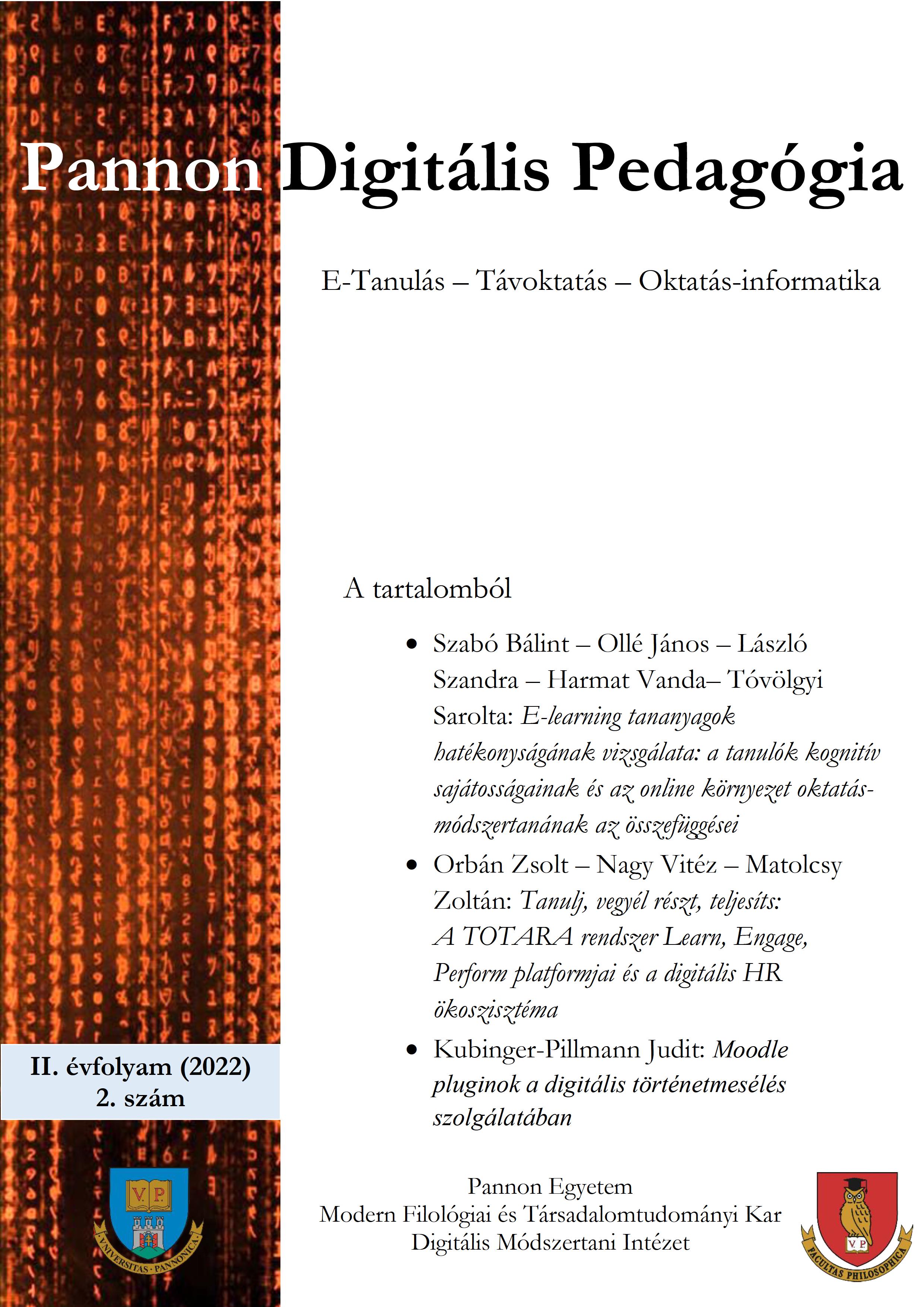Moodle pluginok a digitális történetmesélés szolgálatában
DOI:
https://doi.org/10.56665/PADIPE.2022.2.3Keywords:
higher education, methodology, distance learning, Moodle plugin, digital storytellingAbstract
We all love to tell stories, telling stories takes us out of the monotonous cycle of everyday life for a few minutes. We can all tell stories, but the question is whether we know the complex teaching-learning strategy we call digital storytelling. Digital storytelling is a learning organization strategy that supports learning and enables students to work on a topic in varied ways. The method is based on elements in which students go through an interactive
creative process where different focal points can be identified. In its identifiable phases of finding - telling – sharing, Moodle as a learning environment enables the support of these creative processes with its diversity of
functionality. On the one hand, with its modular structure, and on the other hand with the help of various plug-in
activity modules, it ensures a varied work form in a well-planned way from the point of view of educational
methodology, both through individual and group work organization methods. By properly identifying and
grouping the Moodle plugins, we can provide the students with the consciously planned activities of the research,
cooperation and collaboration. At Pannon University, a separate course deals with this complex method also in the
form of distance education. In the context of distance education, it becomes questionable which Moodle plugins
support the learning, mastering and application of the method most effectively. In my presentation, I will highlight
which Moodle plugin(s) most effectively help shape the story at certain stages of the birth of the digital story. In
distance education, these additional functions can play a very important role, since the independent learning
process can only be effective if it is supported by appropriate types of tasks and activities. I am trying to thematize the various Moodle plugins in order to make the learning of the digital storytelling method in distance education even more effective.
References
BÁN Dávid – NAGY Balázs (2016). Digitális történetmesélés a gyakorlatban. Képzési útmutató digitális történetmesélés műhelyek számára. Budapest: Anthropolis Egyesület.= http://idigstories.eu/wp-content/uploads/2016/11/idigstories_guidehun.pdf (Az utolsó letöltés dátuma: 2022. október 15.)
DRINGÓ-HORVÁTH Ida – DOMBI Judit – HÜLBER László – MENYHEI Zsófia – M. PINTÉR Tibor –PAPP-DANKA Adrienn (szerk.) (2020). Az oktatásinformatika módszertana a felsőoktatásban. Budapest: Károli Gáspár Református Egyetem IKT Kutatóközpontja.=https://btk.kre.hu/images/ikt/oktatasinformatika_a_felsooktatasban.pdf (Az utolsó letöltés dátuma: 2022. október 15.)
FARKAS Anett (2021). A történetmesélés pedagógiai módszere a felsőoktatásban. In Fodorné Dr. Tóth Krisztina PhD (szerk.), Tanulás - Tudás – Innováció a felsőoktatásban – Reflektorfényben az innováció kihívásai. Tanulmánykötet. MELLearN (pp.22-33.). Pécs: „MELLearN – Felsőoktatási Hálózat az Életen át tartó tanulásért” Egyesület Debreceni Egyetem.
LANSZKI Anita (szerk.) (2017). Digitális történetmesélés a nevelési-oktatási folyamatban. Eger: Líceum.
KATONA Nóra (2017). Kiemelt kompetenciaterületek. Oktatás 2030 =https://www.oktatas2030.hu/wpcontent/uploads/2020/05/kiemelt-kompetenciateruletek.pdf (Az utolsó letöltés dátuma: 2022. október 9.)
KUBINGER-PILLMANN Judit (2022). Digitális történetmesélés a tanárképzésben. In Somogyvári Lajos –Tóth József (szerk.), Humán tudományok: pedagógusképzés és tananyagfejlesztés 2. Budapest: Akadémiai Kiadó = https://mersz.hu/hivatkozas/m945htpt2_63 (Az utolsó letöltés dátuma: 2022. október 13.)
OLLÉ János (2017). A digitális történetmesélés a didaktikában és az iskolapedagógiában. In Lanszki Anita (szerk.), Digitális történetmesélés a nevelési-oktatási folyamatban. (pp.17-21.). Eger: Líceum Kiadó.
MEADOWS, D. (2003). Digital storytelling: Research-based practice in new media. Visual Communication, 2(2), pp.189–193. = https://doi.org/10.1177/1470357203002002004 (Az utolsó letöltés dátuma: 2022. október 13.)
MOODLE PLUGINOK = https://moodle.org/ (Az utolsó letöltés dátuma: 2022. október 13.)
PITLIK László – RIKK János – GÁNGÓ Vince – TÓTH Csaba (2020). A távoktatás, mint kritikus oktatási üzem – IT-aspektusai, avagy felkészülés a duális képzésre. Magyar Internetes Agrárinformatikai Újság, 266. = https://miau.my-x.hu/bprof/kritikus_uzem.pdf (Az utolsó letöltés dátuma: 2022. október 15.)
Downloads
Published
Versions
- 2023-01-16 (2)
- 2022-12-24 (1)

